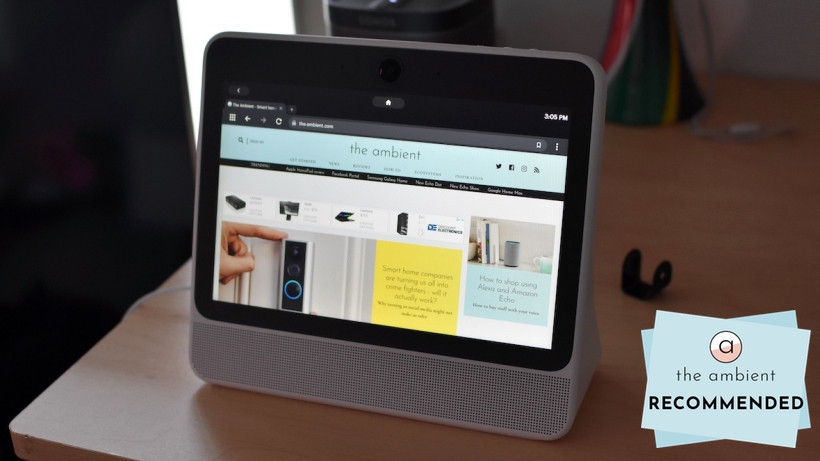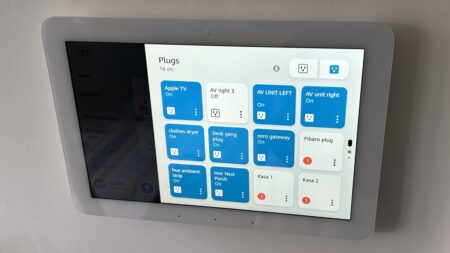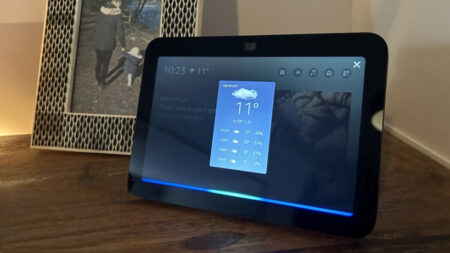A smart display with stupid timing
The Facebook Portal is a smart speaker that puts all its focus on video chatting. The result is a limited, but technologically impressive gadget that in some ways puts the Echo Show to shame. Facebook's tunnel vision may be to its detriment though, as the Portal is lacking in wider features.
Pros
- Camera tech is ace
- Good sound quality
- Some nice social features
Cons
- Limited features
- Too expensive
- Privacy concerns
When Facebook’s Portal and Portal Plus speakers arrived, plenty of people, myself included, had a lot of feelings, but the overwhelming reaction was one of bewilderment.
Update: The new Facebook Portal reviewed
That’s because Portal followed a string of privacy debacles for the company, chiefly the Cambridge Analytica scandal, making us wonder why Facebook didn’t wait longer to launch its first fully homegrown bit of hardware. It’s the type of extreme Silicon Valley hubris you can almost respect. We just inadvertently exposed the details of 50 million people – would you like to put our camera in your home?
Read this: The best smart speakers
This isn’t to say it’s the only company that’s been marred by privacy problems. Amazon and Google’s smart speakers have made headlines for their own security gaffes – the difference being that most of this happened after these speakers were already in people’s homes. For Facebook, it’s showing up to the party with its reputation already dented.
I realize I’m talking a lot about the bad stuff here, but nothing exists in a vacuum and it’s difficult to review the Portal outside of this context. What I will say off the bat is this: Portal is by far the best smart speaker for video calling you can buy right now, and an impressive bit of first-gen hardware from the company.
Let’s get into it.
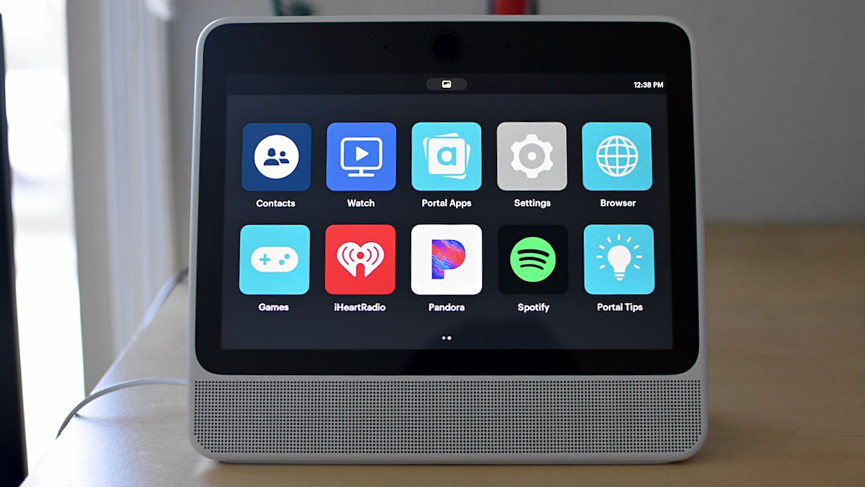
Facebook Portal and Portal Plus: Design
As mentioned, there are two versions of the Portal. The “regular” $199 model looks a lot like Amazon’s Echo Show – it’s a 10.1-inch, angled, rectangular box. It’s also smaller than the $349 Portal Plus, the 15.6-inch behemoth that honestly looks more like a PC than a smart speaker when the screen is horizontal. The Plus also has a neat trick that the smaller one doesn’t: the screen can be rotated 90 degrees for portrait mode. It’s easy (and satisfying) to spin the screen, and everything will automatically switch the second you do.
Battery option: Facebook Portal Go review
The smaller Portal has a 720p screen while the Plus has a 1080p display; both are nice and crisp, but while I’ve watched a few videos on the Portal and Portal Plus, I can’t see this ever being its primary purpose. Portal is foremost a video chat speaker, and whichever one you pick you’ll get the same 12-megapixel camera, 140-degree field of view and up to 8x digital zoom.
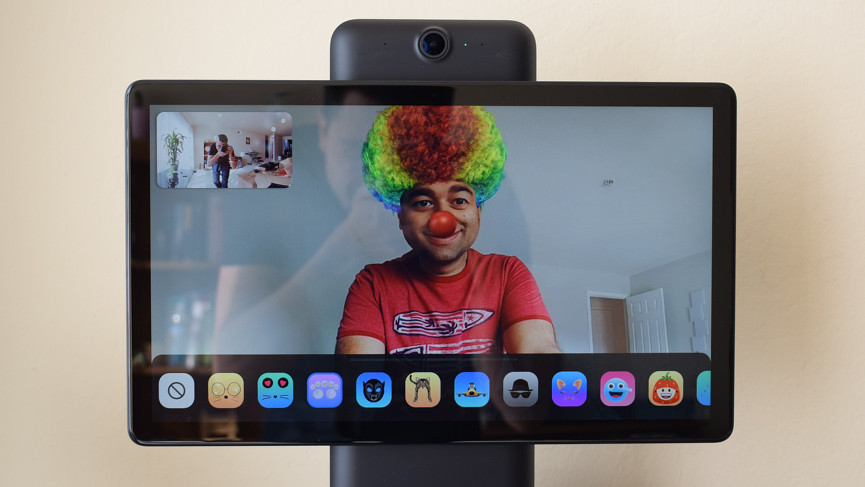
We’ll get onto all that stuff shortly, but the video tech on the Portal is pretty great. The camera lives directly above the display on both speakers – on the Plus it’s actually embedded into the stand – and both come with a camera cover that you can slide over the lens. Nobody can see into your home without you answering the Portal, but it’s a welcome feature for added peace of mind. When you have stories of FaceTime bugs self-answering people’s iPhones, it’s perfectly valid to be concerned about these things.
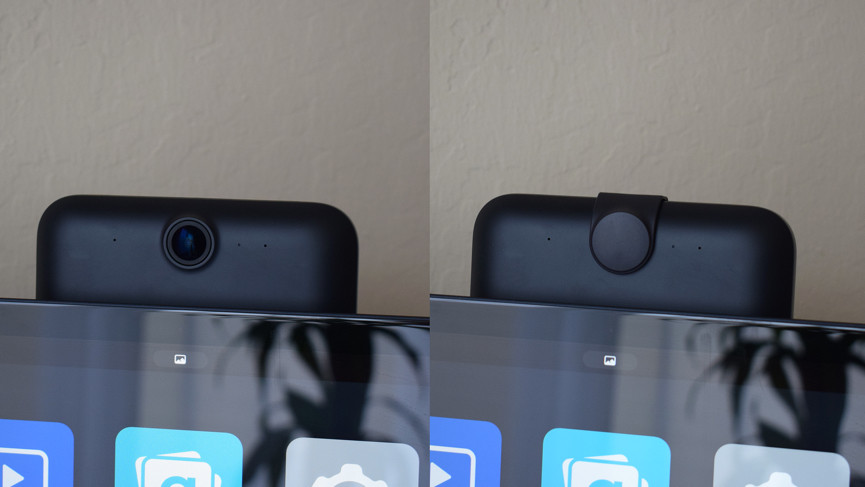
On the top of the Portal are three buttons for controlling the volume and muting the mic. These are physical buttons on the regular Portal but haptic touchpoints on the Plus.
New entry: Lenovo Smart Display 7 review
For first-gen products, the Portal and Portal Plus are impressively well built. The Portal does feel like a slightly less attractive Amazon Echo Show though (Amazon’s screen is also 10.1 inches), and the Portal Plus will probably be too large for most people’s needs. When the display is horizontal it looks like a desktop computer, when it’s vertical it looks like something that belongs in an office.
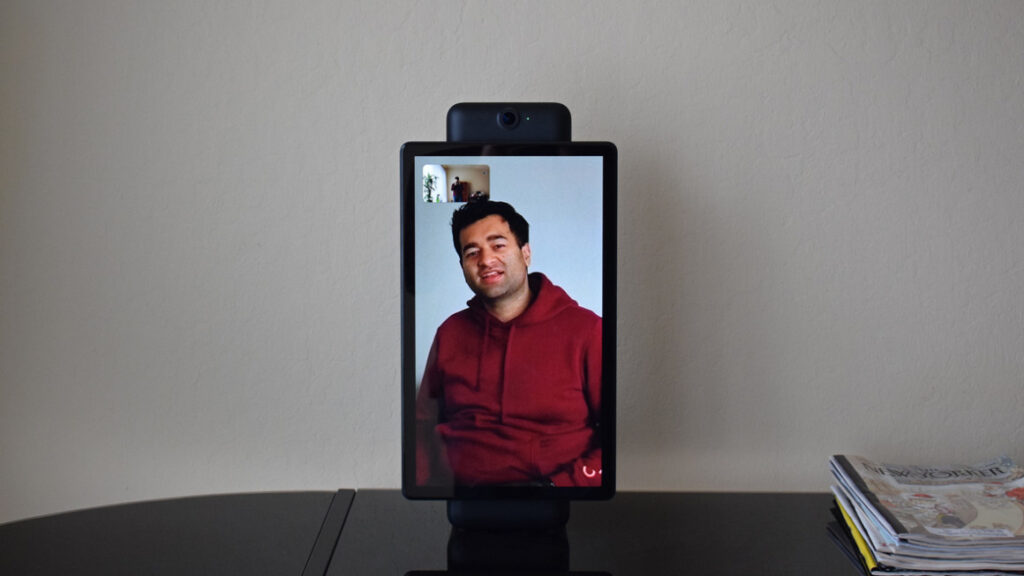
Facebook Portal and Portal Plus: Features
The Portal comes with a handful of Facebook apps, music services, and Alexa. That last one is important: Facebook’s major disadvantage in going up against Amazon, Google and Apple is that those companies have existing smart home ecosystems for their smart speakers to neatly slip into. Facebook doesn’t, so it’s relying on Alexa for an entry to the smart home and Messenger for communication.
Interestingly (and perhaps to its detriment) the Portal isn’t going all-out against Echo and Google Home. Instead of offering a gamut of smart home features, it keeps its focus mostly on being a great video chatting device – and to its credit it achieves that pretty well.
You can interact with the Portal either using the touchscreen or by voice. Just say, “Hey Portal…” and then give your command. The problem here, assuming you use Alexa, is that you have two assistants to speak to, yet Alexa does most of the grafting in this relationship. I’ve called on Portal to start video chats, but most of the time I’ve defaulted to Alexa.
The Portal also comes with integration with Spotify, Pandora and iHeartRadio, and you can share music with other people on the call, so long as they’re also using a Portal speaker. There are some caveats here: for instance, you can’t use the “Hey Portal” command to load songs while you’re talking (you’ll have to tap manually), which is a bit of a let down. Portal will tell you that it’s in the works if you try though, so that’s good. The speaker on the Portal and Portal Plus is also more impressive than I’d expected. It’s never going to replace my Sonos, but it’s surprisingly crisp.
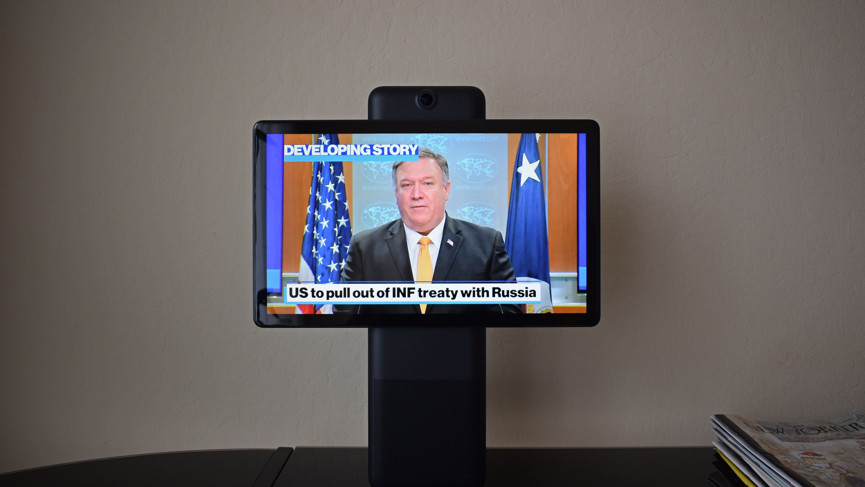
The Portal has a version of Google Chrome built right in, which is speedy and easy to use. You can’t seem to sign in to Chrome and get all your bookmarks and what not, and it’s unlikely you’re going to use Chrome for a lot of stuff, but it’s there and it works for YouTube. In fact, you’ll have to use Chrome for YouTube and other video services, because only Facebook Watch is offered as a native app. Facebook doesn’t have the exclusive content that Amazon, Hulu, Netflix, or YouTube do, but it’s got a good amount of viral videos. A lot of news networks use Facebook, so news junkies will be well taken care of.
Since launch, Facebook has added Messenger games too – including Draw Something, Sudoku and Words with Friends. Now you’ve one less excuse to ignore the stream of notifications telling you Jeff from high school wants to play Battleship.
But again, because this is a stationary display you are supposed to use for video calls, it’s fine. It’s nice to be able to watch some viral videos while you’re cooking or doing your laundry – and you do have YouTube via the browser if you’re hurting for things to watch – but it’s probably going to be a secondary use, if that.
Oh, and when you’re not using it, you can have the Portal scroll through a slideshow of your Facebook photos, should you be so inclined. I prefer the stock shots of deserts and mountain ranges over reminders of my awkward teenage years, but to each their own.
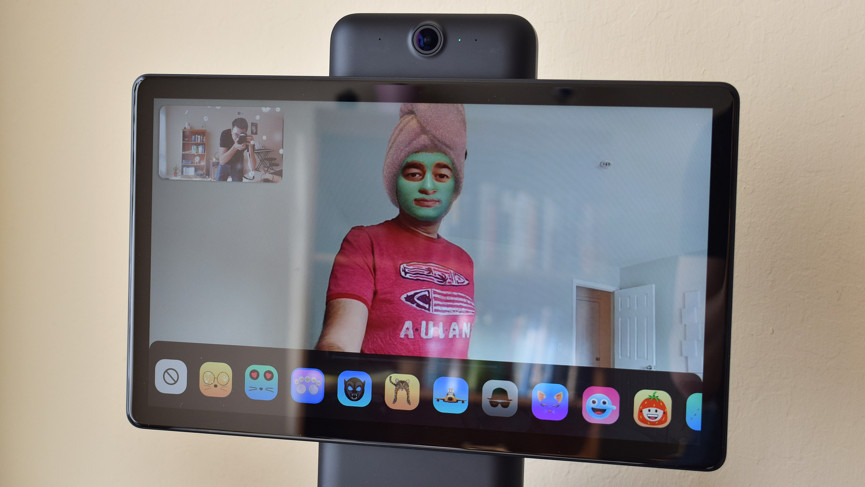
Facebook Portal and Portal Plus: Smart Camera and chatting
This is Portal’s big party trick. The camera on the Portal goes beyond what we’ve seen on other smart displays and will actually track you around the room. Move side to side and it will pan to keep you in shot; move further away from the camera and it will zoom in on you. They’re neat tricks and they work impressively well. In fact, it’s amazing how far the camera can pan across the room from its fixed position.
Video chats on Portal take place over Facebook Messenger, but the other person can use the mobile Messenger app. This does mean certain features won’t work – like sharing music – and the quality of their video probably won’t be as good, but otherwise it works similarly. Just say, “Hey Portal, call Jeff” and it will scan your Facebook contacts to find Jeff. If there are two Jeffs, it will ask you which one you want to call. If you only know one Jeff, it will still read the full name aloud and ask you to confirm that you definitely want to make the call. It’s a nice safety guard against accidentally dialing Jeff at 3am. (“Who wants to play Battleship now, huh?”)
If you’re chatting to someone who’s using the Messenger app they won’t get all the neat panning and scanning, but it makes Portal-to-Portal video calls pretty wild. There’s so much room to manoeuvre and the Portal keeps you locked in frame the whole time (within reason). It gets around one of the pain points of smart displays like the Echo Show, which is that they have to remain fixed in place.
Facebook’s also thrown in some AR filters and even a feature where you can read the other person a story from an animated book. That one could be fun with kids, but I got bored pretty fast.
The one real “wow” moment I had with Portal was when I was video chatting with a friend who was using her phone and I played some music on my end. Even with the volume up loud she couldn’t hear the music, yet the mic still picked up my voice when I was talking to her.
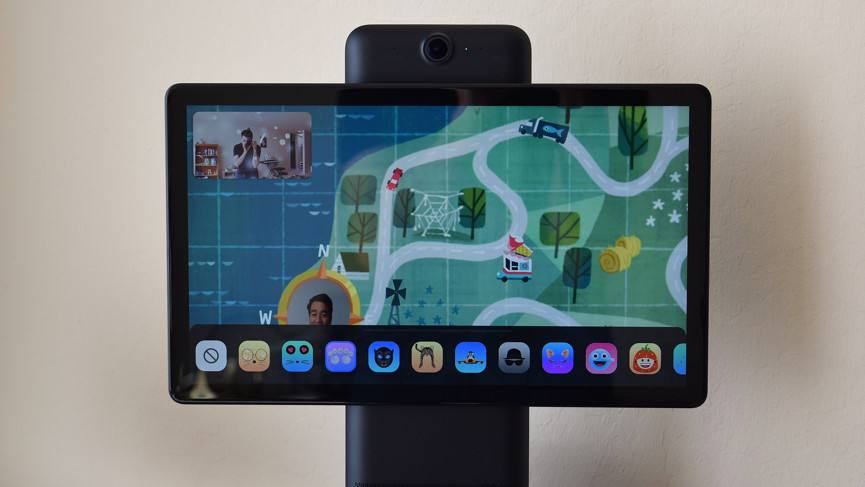
Weirdly, despite that amazing moment, the voice pickup has been inconsistent in testing, particularly when moving away from the speaker. During a Portal-to-Portal chat with my colleague, we both found that moving away from the speaker produced a more tinny sound on either end. Another time we tried it and the sound quality was a little improved at a distance, but still not great.
And what about privacy? Facebook says all calls are encrypted, but that’s about it. And that said, last year the company confirmed that it could use some data collected from user behaviour – call lengths, aggregate usage of apps – to target ads. Here’s some more from Facebook’s website:
“When Portal’s microphone is enabled, Portal listens for a wake word (e.g. ‘Hey Portal’), but does not send audio information to Facebook unless Portal detects a wake word. Once a wake word is detected, the wake word and subsequent audio information like voice queries and commands (which may include ambient noise or background conversations) will be sent to Facebook.“
So Facebook is collecting some stuff – it shouldn’t be much, but this might not be enough to allay some people’s concerns.
And if you’ve finally quit the big blue social network? Don’t get a Portal. You’re essentially paying for a giant paperweight. No friends on Facebook anymore? Don’t get a Portal.
Otherwise, Facebook’s speaker does a great job of simply being a video calling device. I actually think it would have been smarter to pitch this more directly to businesses, which I think would find a lot of benefit in the camera technology. Portal’s biggest problem isn’t the technology, but the company behind it and the climate in which it was launched.
Facebook is really trying hard to emphasise the privacy considerations of Portal, and to its credit it’s done some due diligence, but some people won’t want a Facebook speaker in their home, pure and simple. For the Facebook aficionados who do find themselves using Messenger video calling a lot, and are comfortable with what Facebook already knows about them, the Portal definitely has something to offer.


